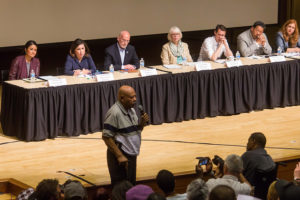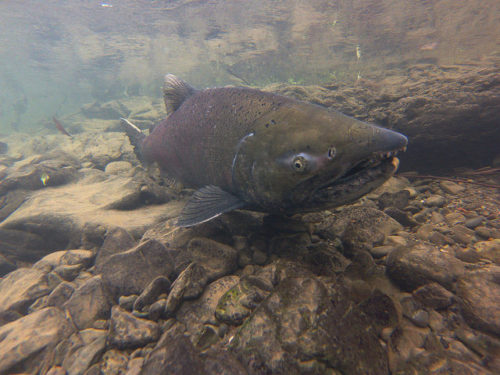SUBSCRIBE TO THE FREE NEWSLETTER
A scientific approach to voting in Washington
The organization Seattle 500 Women Scientists is dedicated to advocating for equity, justice, and inclusivity in the sciences; increased scientific literacy through public engagement; and empowering women in science. Member and organizer Sarah Myhre wrote an essay for Cascadia Magazine earlier this year about women scientists becoming more involved in politics and public policy.
In today’s issue of Cascadia Daily, we’re publishing Seattle 500 Women Scientists’ voting recommendations for three statewide initiatives on the ballot in Washington…
This November in Washington State we have the opportunity to address three critical interrelated issues through a set of initiatives that represent the intersection between science, policy, and community health and well-being intersect. These initiatives all draw on broad coalitions of seemingly disparate communities and represent years of work and solutions which draw on the work of scientists from a range of disciplines.
Gun Violence: Initiative 940 – YES, Initiative 1639 – YES
 Initiative 940 grew out of the groundbreaking, community-building work of Andre Taylor through his Not This Time organization. I-940 seeks to reduce police homicides in Washington State through mandatory training for all law enforcement and the implementation of key changes in the policies regarding use of lethal force. Notably, the initiative would mandate ongoing training for all law enforcement officers in de-escalation, mental health, and first aid.
Initiative 940 grew out of the groundbreaking, community-building work of Andre Taylor through his Not This Time organization. I-940 seeks to reduce police homicides in Washington State through mandatory training for all law enforcement and the implementation of key changes in the policies regarding use of lethal force. Notably, the initiative would mandate ongoing training for all law enforcement officers in de-escalation, mental health, and first aid.
This initiative gathered support following the tragic killings of Che Taylor, Andre’s brother, and Charleena Lyles, a pregnant mother of four. Initiative 940 is a truly grassroots effort, primarily driven by volunteers and community organizing. It guarantees that the communities most impacted by police violence will have a seat at the table.
But gun violence is about more than police homicides. It ripples through communities in a multitude of ways, and intersects with education, physical and mental health, and domestic violence. A second initiative, I-1639, takes aim at state laws regarding access to firearms.
 Specifically, I-1639 raises the age to purchase semi-automatic assault rifles to 21, creates enhanced background checks to keep guns out of the hands of domestic abusers and those with mental health records, mandates completion of firearm safety training within the past five years, and holds gun owners accountable if a person accesses and uses an insecurely stored firearm to hurt themselves or someone else.
Specifically, I-1639 raises the age to purchase semi-automatic assault rifles to 21, creates enhanced background checks to keep guns out of the hands of domestic abusers and those with mental health records, mandates completion of firearm safety training within the past five years, and holds gun owners accountable if a person accesses and uses an insecurely stored firearm to hurt themselves or someone else.
As with I-940 this initiative builds on community organization and has gained momentum in response to tragedy, this time the Parkland High School mass shooting in February 2018. While mass shootings get the most media coverage, gun violence is much larger than the events which break the national news. In
fact, the majority of gun deaths in the US are from suicide (60%) (US Department of Justice). Additionally, evidence increasingly demonstrates the role that guns play in domestic violence (Sorenson 2018; Sorenson 2017). Passage of both initiatives would represent an opportunity to decrease unnecessary deaths in our state and improve mental health through reducing stress and trauma in our communities (Bor 2018).
Climate, Pollution and Green Energy, Initiative 1631 – YES
 The third initiative, I-1631, is a climate initiative that seeks to reduce our state’s carbon pollution by levying a fee on some of the largest polluters and reinvesting in clean energy and jobs. From the beginning, the writers of I-1631 have sought to build a coalition that centers the needs and concerns of those most impacted by pollution and climate change, specifically low income communities and people of color. It is supported by the largest coalition to ever back an initiative in Washington State, ranging from labor, to local tribes, to environmental justice groups.
The third initiative, I-1631, is a climate initiative that seeks to reduce our state’s carbon pollution by levying a fee on some of the largest polluters and reinvesting in clean energy and jobs. From the beginning, the writers of I-1631 have sought to build a coalition that centers the needs and concerns of those most impacted by pollution and climate change, specifically low income communities and people of color. It is supported by the largest coalition to ever back an initiative in Washington State, ranging from labor, to local tribes, to environmental justice groups.
Putting a price on carbon provides an economic signal that carbon emitters at all levels of the economy will respond to. Carbon pricing is recognized as the most flexible and least-cost-to-society way to achieve the goal of reducing climate change-inducing carbon pollution.
Climate change is linked to violence, with growing evidence highlighting how climate eventscan lead to increased experience of gender-based violence, intimate partner violence, and risk of depression and posttraumatic stress disorder (Anastario M 2009; Schumacher JA 2010; Harville EW 2011). These intersecting issues act synergistically to negatively affect safety, health, and quality of life in our communities.
Reducing carbon emissions isn’t simply about protecting the environment. Fundamentally, it is about protecting our health, our cultures, our homes and our children. Initiative 1631 is a profoundly hopeful and courageous initiative which, if passed, will situate our state as a groundbreaking international leader.
(References at the bottom of this email…)
Cascadia Magazine original: “Trudeau”
Rob Lewis’s poem “Trudeau” expresses what happens when a prime minister develops an obsession for pipelines and massive LNG projects:
“He tried to speak but instead made the gurgle
of an orca’s blowhole filling with tar.”
Read the full poem here.
Judge orders EPA to protect Columbia River salmon
According to the Seattle Times, last week a federal judge ruled the the US Environmental Protection Agency isn’t doing enough to protect salmon in the Columbia River. Dams and warming temperatures have dramatically reducing native salmon, which in turn have affected orcas in the Salish Sea.
Oregon governor candidates on death penalty + other election news
After a Washington supreme court decision that invalidated that state’s death penalty, focus is now on the Oregon gubernatorial candidates’ positions on capital punishment.
In other election news, Alaska governor Bill Walker, an independent, stepped out of the race and announced he would support Democrat Mark Begich over GOP candidate Mike Dunleavy. Meanwhile, the Portland Tribune looks at how the Portland city council might swing depending on whether activist Jo Ann Hardesty or Multnomah County Commissioner Loretta Smith wins. And Seattle Globalist looks at an upstart run by Democratic Socialist Sarah Smith against Adam Smith in Seattle’s 9th congressional district.
Using surplus public land for housing
Josh Cohen, writing for Crosscut, argues that Seattle should use surplus public land to build below-market housing. Meanwhile an editorial by Share the Cities at the South Seattle Emerald urges that plans to turn a Seattle semi-private park into a gated community be rejected. In other housing news, Vancouver’s new mayor may find opposition to his plans for increased density from a surprising source: the city’s new Green Party council members.
Nike’s influence: from University of Oregon to governor’s race
Eugene Weekly talks with the author of The University of Nike, an investigation into how massive donations to the University of Oregon by Portland-based Nike have led to a culture of secrecy and silencing of dissent. Rolling Stone looks at why Nike founder Phil Knight has pumped $2.5 million into the campaign of GOP candidate for governor Knute Buehler. The Oregonian reports than an investigation found no wrongdoing in a deal brokered by governor Kate Brown between Nike and unions to stop a corporate transparency measure from going on the November ballot. And in other news from our future corporate overlords, Amazon is working on technology that will allow the US government to conduct mass surveillance.
Portland’s new Chinatown museum
Oregon Arts Watch reports on an opening show of art at Portland’s new Chinatown museum. The show includes sharp, poignant installations by three Asian-American artists: Roberta May Wong, Ellen George, and Lynn Yarne.
Aileen Keown Vaux reads her poem “LOL”
Over at Spokane Public Radio, have a listen to Eastern WA University creative writing grad Aileen Keown Vaux reading the poem “LOL” from her chapbook Consolation Prize.
“My mother would send me to the backyard to ‘get some air’
Get some air, she said,
as if air were in short supply…”
Hear the full poem here. Vaux will read from her book along with poets Rachel Kessler, Melinda Mueller, Maya Jewell Zeller, and E. Briskin at Seattle’s Hugo House at 7 pm, Wed. October 24 at an anniversary celebration for Entre Rios Books, a Seattle-based indie poetry press. That’s today’s rather text-heavy round-up of news, arts, and culture from across the Pacific Northwest.
Have a superlative evening! –Andrew Engelson
Photo credits: chinook salmon by California Sea Grant CC BY-SA 2.0, hearing on police shooting of Charleena Lyles courtesy of Seattle City Council, assault rifle in public domain, Anacortes refinery by Walter Siegmund via Wikimedia Commons CC BY-SA 3.0
References for Seattle 500 Women Scientists voting guide:
Anastario M, Shehab N, Lawry L. Increased gender-based violence among women internally displaced in Mississippi 2 years post-Hurricane Katrina. Disaster Med Public Health Prep. 2009 Mar;3(1):18-26. doi: 10.1097/DMP.0b013e3181979c32.
Bor J, Venkataramani AS, Williams DR, Tsai AC. Police killings and their spillover effects on the mental health of black Americans: a population-based, quasi-experimental study. Lancet. 2018 Jul 28;392(10144):302-310
“Bureau of Justice Statistics Key Facts at a Glance.” Bjs.ojp.usdoj.gov.2010-01-20.
Harville EW, Taylor CA, Tesfai H, Xu Xiong, Buekens P. Experience of Hurricane Katrina and reported intimate partner violence. J Interpers Violence. 2011 Mar;26(4):833-45. doi: 10.1177/0886260510365861. Epub 2010 May 21.
Ford CL, Airhihenbuwa CO. Critical Race Theory, race equity, and public health: toward an antiracism praxis. Am J Public Health. 2010 April 1. 100 Suppl 1:S30-5
Schumacher JA, Coffey SF, Norris FH, Tracy M, Clements K, Galea S. Intimate partner violence and Hurricane Katrina: predictors and associated mental health outcomes. Violence Vict. 2010;25(5):588-603.
Sorenson SB, Spear D. New data on intimate partner violence and intimate relationships: Implications for gun laws and federal data collection. Prev Med. 2018 Feb;107:103-108.
Sorenson SB. Gun in intimate partner violence: Comparing incidents by type of weapon. J Womens Health. 2017 Mar;26(3):249-258

